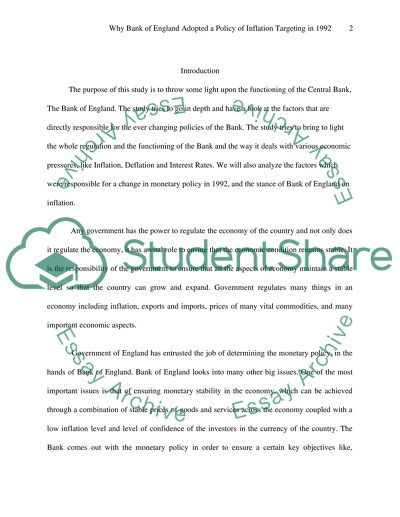Cite this document
(“Why did the bank of England adopt a policy of inflation targeting in Essay”, n.d.)
Why did the bank of England adopt a policy of inflation targeting in Essay. Retrieved from https://studentshare.org/miscellaneous/1540130-why-did-the-bank-of-england-adopt-a-policy-of-inflation-targeting-in-1992-and-how-has-the-pursuit-of-inflation-targeting-been-linked-to-attempts-to-make-monetar
Why did the bank of England adopt a policy of inflation targeting in Essay. Retrieved from https://studentshare.org/miscellaneous/1540130-why-did-the-bank-of-england-adopt-a-policy-of-inflation-targeting-in-1992-and-how-has-the-pursuit-of-inflation-targeting-been-linked-to-attempts-to-make-monetar
(Why Did the Bank of England Adopt a Policy of Inflation Targeting in Essay)
Why Did the Bank of England Adopt a Policy of Inflation Targeting in Essay. https://studentshare.org/miscellaneous/1540130-why-did-the-bank-of-england-adopt-a-policy-of-inflation-targeting-in-1992-and-how-has-the-pursuit-of-inflation-targeting-been-linked-to-attempts-to-make-monetar.
Why Did the Bank of England Adopt a Policy of Inflation Targeting in Essay. https://studentshare.org/miscellaneous/1540130-why-did-the-bank-of-england-adopt-a-policy-of-inflation-targeting-in-1992-and-how-has-the-pursuit-of-inflation-targeting-been-linked-to-attempts-to-make-monetar.
“Why Did the Bank of England Adopt a Policy of Inflation Targeting in Essay”, n.d. https://studentshare.org/miscellaneous/1540130-why-did-the-bank-of-england-adopt-a-policy-of-inflation-targeting-in-1992-and-how-has-the-pursuit-of-inflation-targeting-been-linked-to-attempts-to-make-monetar.


